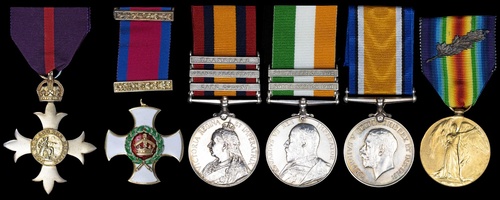
Auction: 25111 - Orders, Decorations and Medals - e-Auction
Lot: 661
The 1918 O.B.E., Boer War D.S.O. group of six awarded to Lieutenant-Colonel A. F. Owen-Lewis, Yorkshire Regiment, late Lancashire Fusiliers, who as further 'mentioned' during both the Anglo-Boer War and the Great War
The Most Excellent Order of the British Empire, Officer's (O.B.E.) breast Badge, 1st Type, silver-gilt, hallmarked for 1918; Distinguished Service Order, V.R., silver-gilt and enamel; Queen's South Africa 1899-1902, 3 clasps, Cape Colony, Orange Free State, Transvaal (Capt: A. F. Owen-Lewis, D.S.O., York. R.); King's South Africa 1901-02, 2 clasps, South Africa 1901, South Africa 1902 (Capt. A. F. Owen-Lewis. D.S.O. York Rgt.); British War and Victory Medals (Lt. Col. A. F. Owen-Lewis.), with M.I.D. oak leaves, light contact wear to the campaign awards, overall good very fine (6)
O.B.E. London Gazette 14 June 1918.
D.S.O. London Gazette 27 September 1901.
Arthur Francis Owen-Lewis was born at Trimleston House, Old Merrion on 6 August 1868, the son of Henry and Margret Owen-Lewis of 52 Cranley Gardens and Inniskeen, County Monaghan. His father was Deputy Lieutenant of Monaghan and M.P. for County Carlow, his mother's father was William Henry, Chief Inspector of the Royal Irish Constabulary.
He was commissioned with the 4th (Militia) Battalion, Middlesex Regiment on 22 January 1887. Transferring to a Line Regiment in 1889 he joined the Royal Scots and was advanced Lieutenant with them on 28 July 1892. Appointed Adjutant of the 6th Battalion, Lancashire Fusiliers on 1 July 1898 Owen-Lewis sailed with them to Malta in 1900 before proceeding to South Africa.
Entering the war on 10 February 1900 he was involved with operations in Cape Colony, South of the Orange River, Orange Free State and Transvaal from March-29 November 1900. This likely includes a stiff action at Luckhoff 28 November October 1900 which the 6th Battalion was involved with against Commandant Hertzog.
The Boer's followed their usual tactic of occupying a line of ridges before the British positions and took five hours of rifle and artillery fire. It was clear that the only option was going to be a direct assault into heavy rifle fire, the Battalion performed very well and earned the praise of their commander for the action.
Before joining operations in the Transvaal, Orange River Colony and Cape Colony from 30 November. During this time he was appointed a District Commandant, being 'mentioned' for his services (London Gazette 10 September 1901). The Battalion lost a total of 18 other ranks to enemy action and disease over the course of the war.
Appointed the Governor of Mountjoy Prison at some stage after the war Owen-Lewis retired in 1904 and was awarded the Honorary rank of Major on 7 January 1907. He was later appointed a Prisoner Inspector by the General Prisons Board for Ireland. On the outbreak of the Great War he returned to the colours with the rank of Captain in the Reserve of Officers, being appointed Staff Officer Grade 3.
Owen-Lewis was further advanced G.S.O. Grade 2 on 28 April 1916, while serving as Major. He is noted as serving with Irish Command and Assistant Quartermaster General in France being twice 'mentioned' during this time (London Gazette 25 January 1917, 20 May 1918). His M.I.C. notes the rank of Lieutenant Colonel.
Retiring again after the war Owen-Lewis died at 4 Barkstone Gardens, Kensington on 22 December 1926. Upon his death the Sheffield Daily Telegraph noted that he was the founder of the Army Officer's Art Society. Tragically some fifteen years after his death his wife, Kathleen, burned to death in a fire at her flat in Seaford.
Subject to 20% VAT on Buyer’s Premium. For more information please view Terms and Conditions for Buyers.
Sold for
£2,100
Starting price
£950




